AI Workflow Automation Tools: Pricing Comparison 2026

In 2025, AI workflow automation tools are essential for small businesses to save time and increase productivity. These tools streamline repetitive tasks like data entry, customer support, and marketing. Pricing varies widely, from free, open-source options like n8n to premium tools like Lindy AI starting at $49.99/month. Here’s a quick breakdown:
- n8n: Open-source, self-hosted option. Pricing starts at $24/month for cloud plans.
- Lindy: AI-powered with natural language workflows. Starts at $49.99/month.
- Gumloop: Visual builder with AI assistant. Starts at $37/month.
- Bardeen.ai: Browser-based automation, pricing available via demo.
- Relay: Human-in-the-loop workflows. Starts at $27/month.
- Cflow: No-code platform, $7/user/month (annual billing).
- Make: Drag-and-drop workflows. Starts at $9/month.
- Zapier: Extensive integrations. Starts at $19.99/month.
- Microsoft Power Automate: Microsoft ecosystem integration. Starts at $15/user/month.
- Pipedream: Combines no-code and coding. Starts at $45/month.
Key Insights:
- Free plans are available for many tools, but often with limited features.
- Pricing structures include task-based, credit-based, and subscription models.
- Advanced AI features like natural language processing and document automation are common in higher-tier plans.
- Integration ecosystems differ, with tools like Zapier supporting 6,000+ apps, while others like Cflow focus on 100+ core integrations.
Quick Comparison:
| Tool | Starting Price | Free Plan? | Key Features | Integration Ecosystem |
|---|---|---|---|---|
| n8n | $24/month | Yes (Self-hosted) | Open-source, custom workflows | 100+ |
| Lindy | $49.99/month | Yes | Natural language, 4,000+ integrations | 4,000+ |
| Gumloop | $37/month | Yes | Visual builder, AI assistant | Limited |
| Bardeen.ai | Contact for pricing | No | Browser-based automation | Essential tools |
| Relay | $27/month | Yes | Human-in-the-loop workflows | Wide-ranging |
| Cflow | $7/user/month | 14-day trial | No-code, approval processes | 100+ |
| Make | $9/month | Yes | Drag-and-drop workflows | 2,000+ |
| Zapier | $19.99/month | Yes | 6,000+ integrations | 6,000+ |
| Microsoft Power Automate | $15/user/month | 30-day trial | AI Builder, Microsoft integration | 500+ |
| Pipedream | $45/month | Yes | Combines no-code and coding | Custom APIs |
Choose a tool based on your budget, technical skills, and workflow needs. For businesses looking to extend automation capabilities, resources like God of Prompt offer 30,000+ AI prompts to enhance efficiency.
Stop Worrying About AI Workflow Costs - Here's What I Actually Spend!
1. n8n
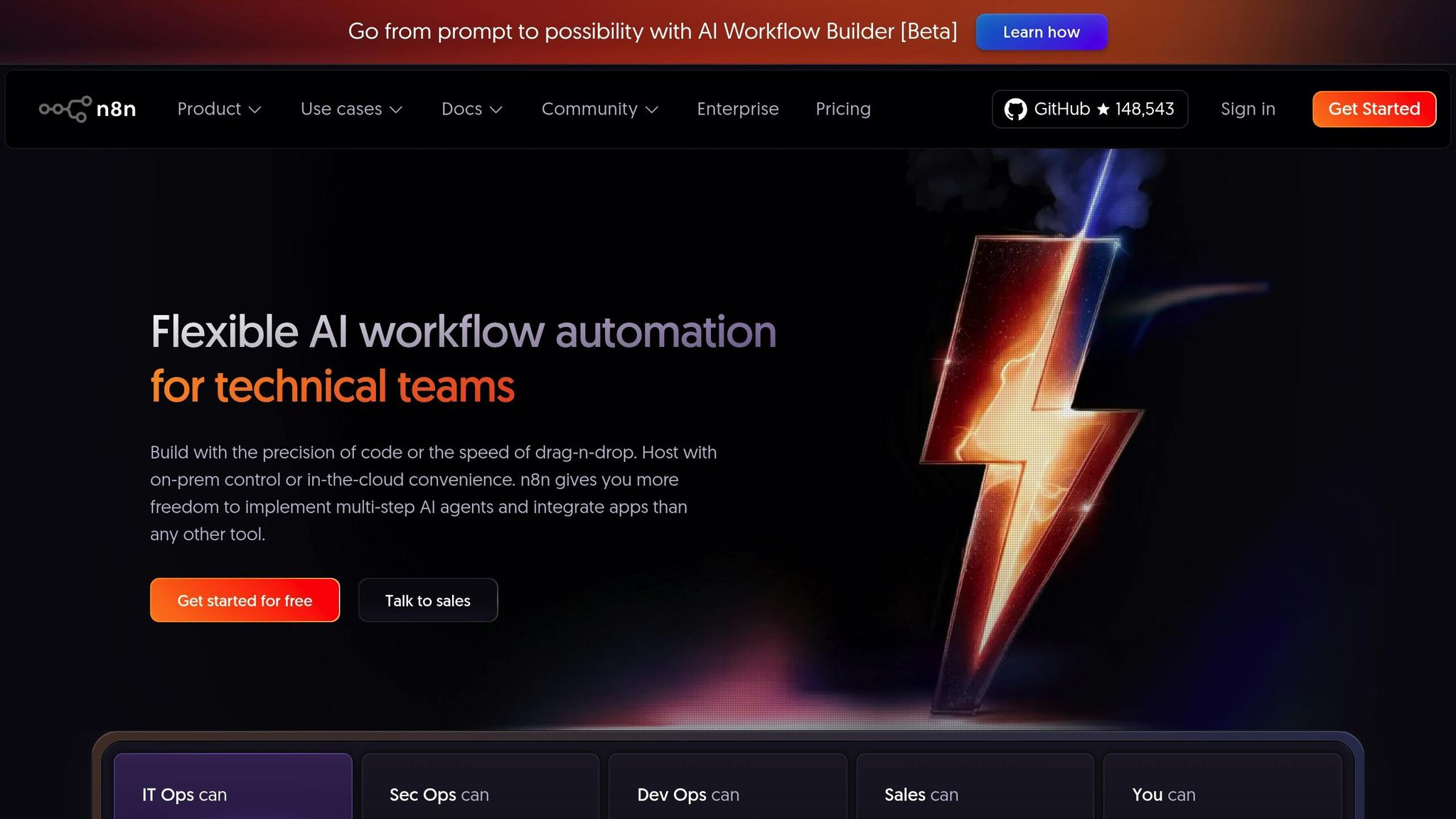
n8n stands out by offering an open-source, self-hosted model that helps small businesses save money. With flexible payment and deployment options, it provides a refreshing alternative to platforms that rely solely on subscription-based pricing.
Starting Price
n8n's cloud plans begin at $24/month for the Starter plan (2,500 executions) and $60/month for the Pro plan (10,000 executions). For larger needs, Enterprise pricing is tailored to specific requirements. This execution-based pricing model ensures transparency, so you’ll always know exactly what you’re paying for - no surprises.
Free Plan/Trial Availability
For those with technical expertise, n8n offers a free self-hosted option for core automation tasks. While setting up and maintaining a self-hosted instance requires some know-how, it can lead to significant cost savings compared to subscription-only platforms.
AI Features
n8n integrates seamlessly with major AI services, enabling workflows like data extraction, sentiment analysis, and document processing. The platform supports connections to popular AI tools such as OpenAI and Google AI, empowering small businesses to automate complex tasks without needing to write code.
Integration Ecosystem
With hundreds of pre-built connectors, n8n integrates with essential tools like Google Workspace, Slack, and Salesforce. Beyond these, the platform includes code nodes, allowing businesses to create custom integrations for virtually any API or service they rely on. This flexibility makes it easier to scale and adapt as your business grows.
Scalability
n8n offers scalability options that cater to businesses of various sizes. Start with the free, self-hosted version and upgrade to cloud plans as your workflow needs expand. For larger operations, the Enterprise plan provides custom execution limits and dedicated support to handle substantial growth. Users have rated n8n highly, with scores of 4.8/5 on G2 and 4.6/5 on Capterra.
Additionally, tools like God of Prompt offer over 30,000 AI prompts and toolkits to help streamline your automation efforts even further.
2. Lindy
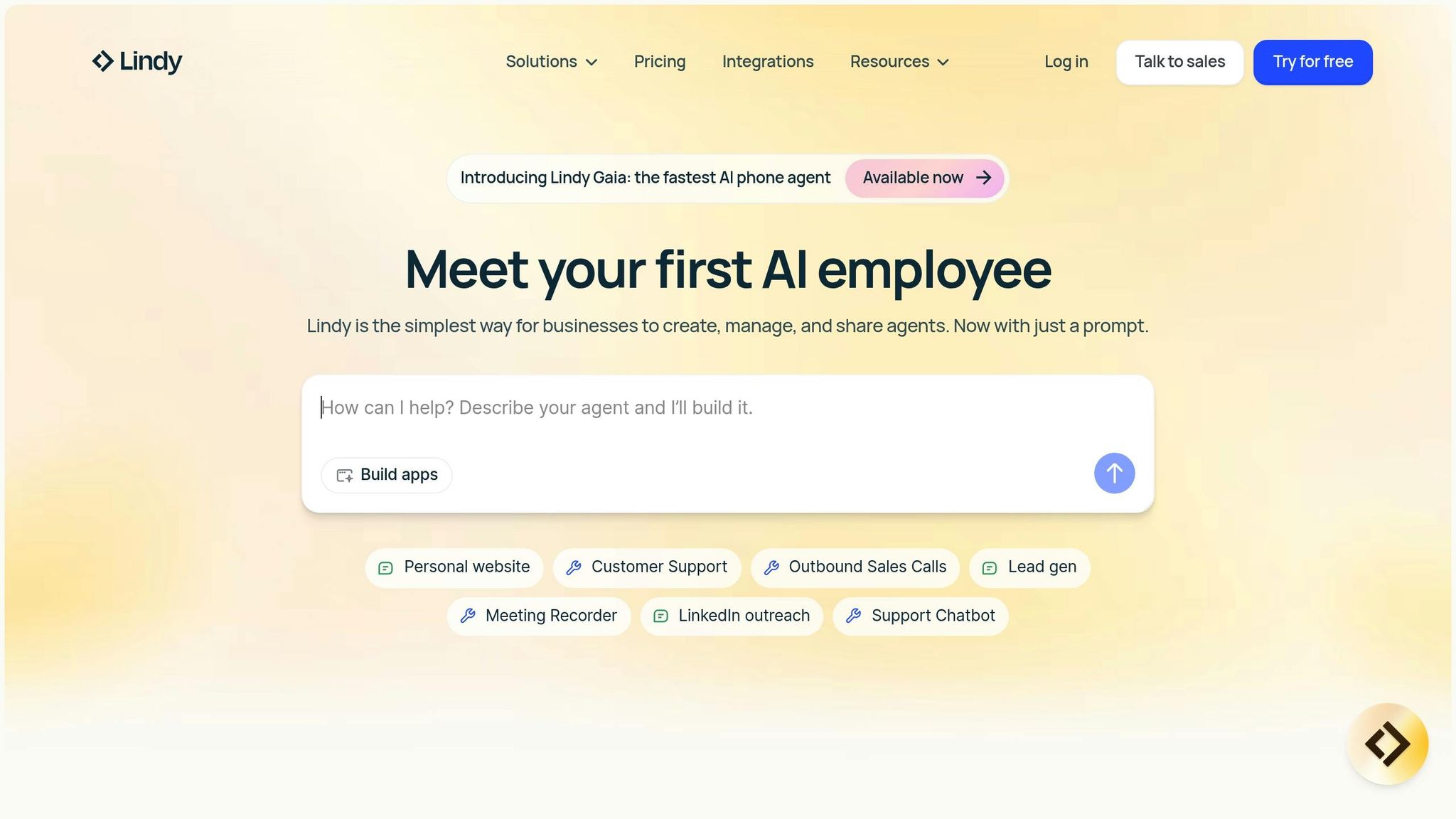
Lindy follows in the footsteps of platforms like n8n, offering an AI-powered solution tailored for small businesses. Launched in 2023 with $35M in funding, Lindy has quickly gained attention, thanks to its focus on natural language processing and multi-step workflows. It’s designed for businesses looking for advanced automation tools that are easy to use, even without a technical background.
Starting Price
Lindy’s Pro plan starts at $49.99 per month, offering 5,000 credits and support for up to 1,500 tasks each month. This pricing places it in a competitive range for businesses seeking robust automation without breaking the bank. The credit-based system is straightforward: every automated task or workflow consumes credits, making it easier to estimate monthly costs.
Free Plan/Trial Availability
For those who want to explore Lindy before committing, there’s a free plan that includes 400 credits per month, allowing up to 40 tasks. It also grants access to more than 100 integrations. While this is ideal for testing the platform’s core features, the limited credits and tasks may not suit businesses with higher demands. Still, it’s a great way to see if Lindy’s AI-driven capabilities align with your needs.
AI Features
One of Lindy’s standout strengths is its ability to execute tasks using natural language processing, supporting over 30 languages in its higher-tier plans. The platform shines in automating repetitive tasks like email management, scheduling, CRM updates, and customer communication. Unlike traditional automation tools that rely on manual triggers, Lindy’s AI understands context and can handle complex, multi-step workflows. This makes it especially useful for marketing teams and customer service departments looking to save time and reduce manual effort.
Integration Ecosystem
Lindy offers an extensive integration network. The Pro plan connects users to over 4,000 tools, including popular platforms like Google Workspace, Slack, and Salesforce. Even the free plan supports more than 100 integrations, ensuring compatibility with most small business applications. This wide range of integrations ensures smooth data flow across your favorite tools.
Scalability
Lindy’s tiered pricing structure is designed to grow alongside your business. The Business plan, priced at $199.99 per month, includes 20,000 credits, unlimited phone calls, and advanced language support. For larger organizations, the Enterprise plan offers custom pricing, priority support, enterprise-grade security, and access to a dedicated AI engineer. This flexibility allows businesses to start small and scale up as their needs evolve. Lindy’s popularity is reflected in its impressive 4.9 out of 5 rating on G2, based on over 109 reviews.
For even more advanced workflows, you can pair Lindy with tools like God of Prompt’s library of 30,000+ AI prompts, taking your automation to the next level.
3. Gumloop
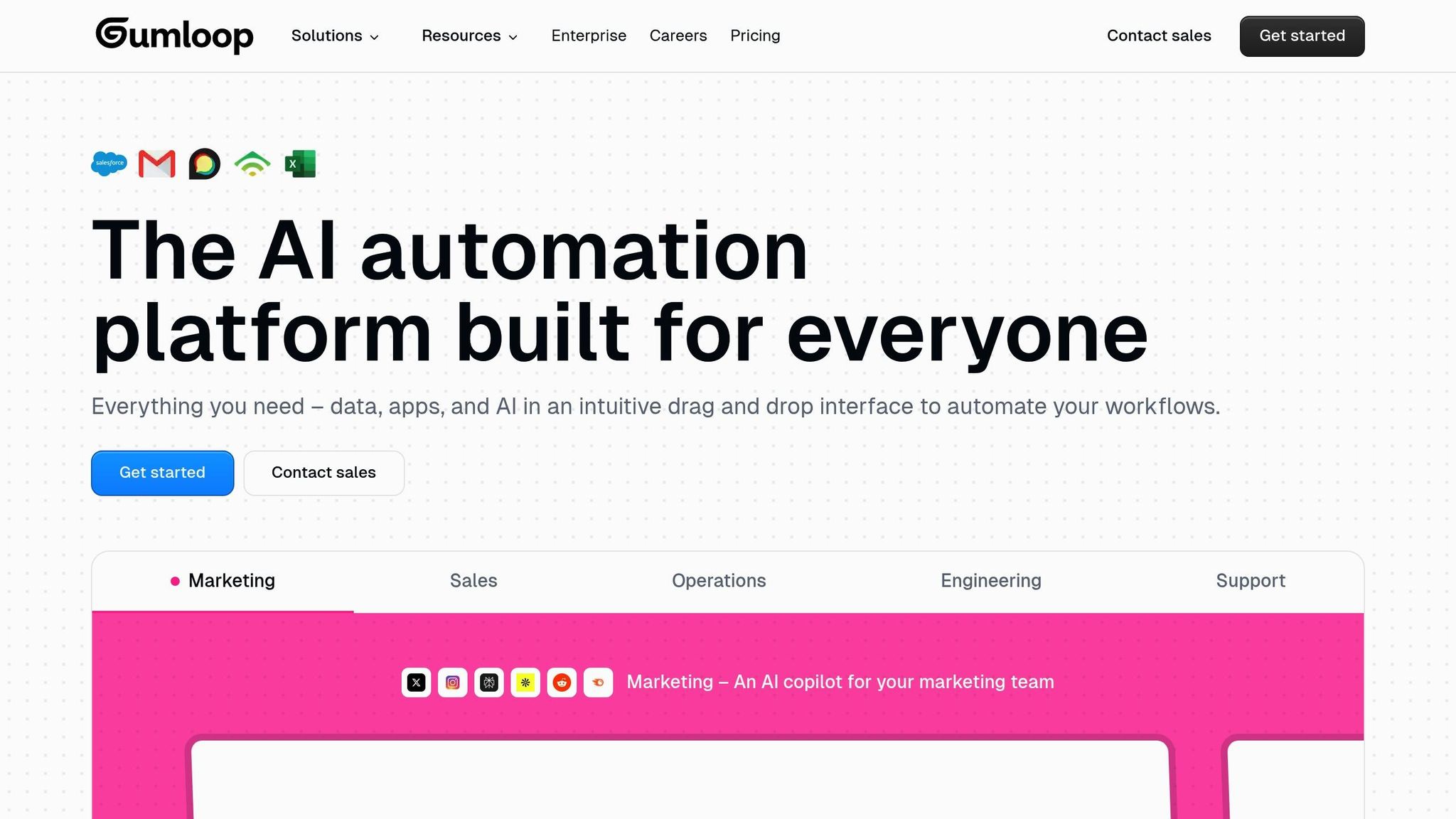
Gumloop has made its mark in the AI workflow automation world by focusing on two key elements: a visually straightforward interface and built-in AI features. Trusted by teams at Shopify, Instacart, and Webflow, this platform combines a simple visual canvas with the power of advanced large language models. Plus, its all-in-one subscription eliminates the need for juggling multiple API keys or add-ons. This streamlined design makes it easier to access features and understand pricing.
Starting Price
Gumloop's paid plans begin at $37/month, offering a single subscription that includes all features. There are no hidden fees or additional costs, making it a practical choice for small businesses aiming to manage automation expenses efficiently.
Free Plan/Trial Availability
For those who want to test the waters, Gumloop provides a free plan. This tier grants basic access to the visual builder and essential workflow automation tools. While specific usage limits aren't publicly disclosed, the free plan is ideal for exploring the platform's capabilities and trying out integrations before upgrading to a paid plan.
AI Features
Gumloop's Gummie AI assistant is at the heart of its automation capabilities. Using the latest large language model technology, Gummie helps users create workflows quickly and with minimal effort. The platform integrates these AI tools directly into its subscription, so there's no need to provide separate API keys. However, advanced users still have the option to use their own.
The platform’s visual canvas makes it easy to design automations for tasks like data processing, content creation, and decision-making. This user-friendly approach ensures that even those without technical expertise can build complex workflows with ease.
Integration Ecosystem
Gumloop’s visual workflow builder connects seamlessly with a variety of popular business tools. This compatibility ensures that businesses relying on common productivity and operational applications can integrate them effortlessly into their workflows.
Scalability
Whether you’re a solo creator or part of a large enterprise team, Gumloop is built to grow with you. The platform supports multiple users in a shared workspace, allowing businesses to scale up, add team members, and handle more complex workflows - all without navigating multiple licenses or feature limitations.
For businesses aiming to get the most out of their automation efforts, pairing Gumloop’s intuitive workflow tools with resources like God of Prompt's extensive library of AI prompts can unlock even more advanced and efficient processes.
4. Bardeen.ai
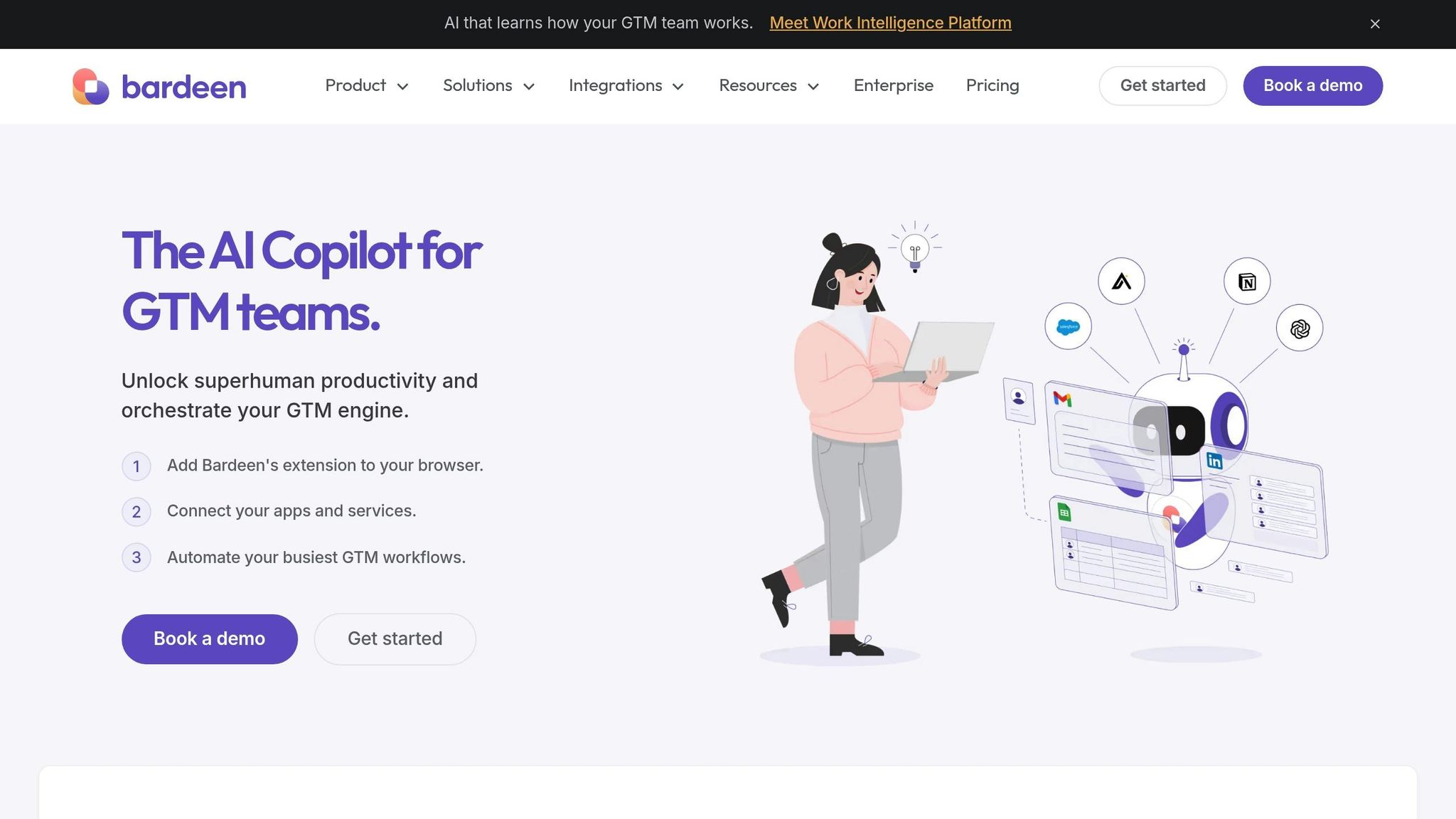
Bardeen.ai acts as an AI copilot for GTM teams, delivered through a browser extension that seamlessly integrates automation into daily workflows. Its effectiveness has caught the attention of companies like Deel, which considers it a key GTM tool in 2025.
Starting Price
Bardeen.ai doesn’t publicly share specific pricing tiers. To get detailed pricing information, businesses need to book a demo. Small businesses looking for upfront pricing details will need to connect directly with the Bardeen team.
Free Plan/Trial Availability
There’s no traditional free plan or trial available. Instead, onboarding begins with a personalized "Get started" process. To explore trial options, businesses should reach out to Bardeen's team directly.
AI Features
Bardeen Playbooks drive its automation capabilities, offering features like:
- Automating lead discovery, CRM updates, and personalized outreach
- Syncing and updating records automatically
- Simplifying sales processes and reporting
- Facilitating effortless task delegation
- Improving customer interactions and relationship management
- Analyzing competitor data to inform strategic decisions
In 2025, Caroline from Deel's Sales team increased her lead list-building efficiency by 75%, saving 60 hours per week on prospecting. Similarly, Pat, a Talent Research professional, saved 15 hours weekly, while Chris, a CEO, reported a 98% cut in expenses.
"Bardeen has become Deel's most critical GTM tool in 2025... It's driving measurable efficiency gains across our entire revenue organization." - Alex, Co-founder & CEO
Integration Ecosystem
Bardeen.ai’s browser-based design supports wide-ranging integration with essential business tools, including CRMs, communication platforms, lead generation systems, project management tools, and customer success software. This connectivity ensures smooth data flow across systems, eliminating silos and simplifying workflows - perfect for businesses aiming to streamline their operations.
Scalability
Bardeen.ai’s design supports growth for businesses of all sizes. With centralized control and billing, administrators can easily manage team members and expenses from a single dashboard. Its SOC 2 Type II certification ensures data security as your business scales, giving you peace of mind while expanding operations.
Pair Bardeen.ai with God of Prompt's extensive prompt library to supercharge workflows.
5. Relay
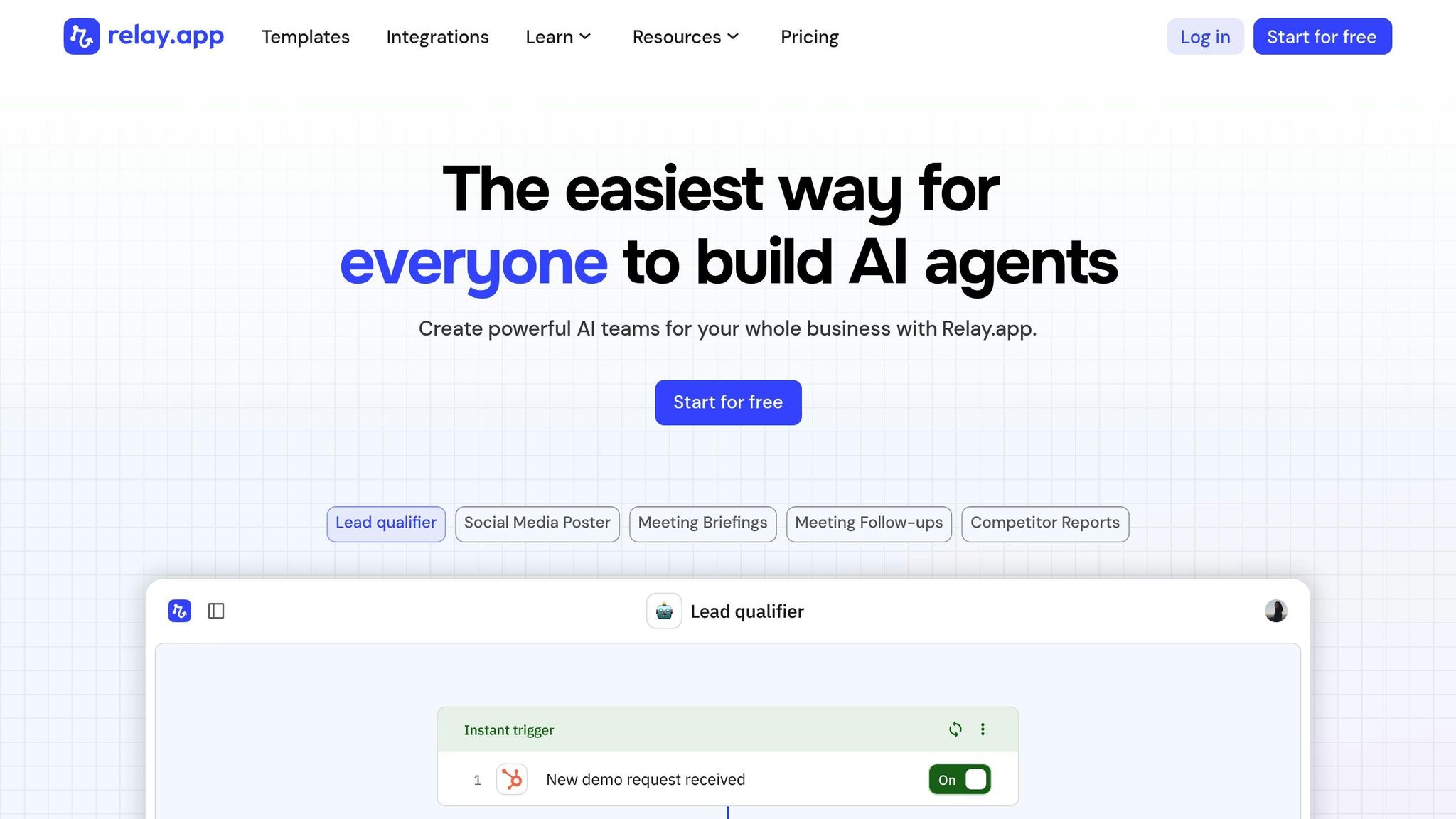
Relay blends artificial intelligence with human oversight to create advanced workflows capable of managing complex decision-making processes.
Starting Price
Relay's pricing begins with the Professional plan at $27/month for one user. This includes 5,000 AI credits and 750 workflow steps. For teams of up to 10 users, the Team plan costs $98/month, providing 5,000 credits and 2,000 workflow steps. For larger operations, the Enterprise plan offers custom limits and SOC2 compliance, tailored to specific needs.
Free Plan/Trial Availability
Relay provides a free plan designed for one user. This includes 500 AI credits and supports multi-step workflows, giving users a chance to explore its capabilities at no cost.
AI Features
Relay stands out by offering more than just task automation. It enables AI-configured steps, custom prompts, and integrates human oversight for critical decision points. This human-in-the-loop approach ensures a balance between automation and precision when handling important tasks.
Integration Ecosystem
Relay connects seamlessly with a wide variety of business tools across marketing, productivity, and communication platforms. Its integration capabilities help eliminate data silos, allowing for smooth and efficient information flow across systems.
Scalability
Relay's tiered pricing model adapts to different needs, from solo users to enterprise-level teams. Its all-in-one subscription approach includes AI credits in each plan, simplifying budgeting by removing the hassle of managing separate API keys or subscriptions. Relay has received glowing reviews, with a 4.9 out of 5 rating on G2 (from over 70 reviews) and a perfect 5 out of 5 on Capterra.
For even greater workflow efficiency, consider pairing Relay with God of Prompt, which offers an extensive library of prompts to supercharge your automation efforts.
6. Cflow
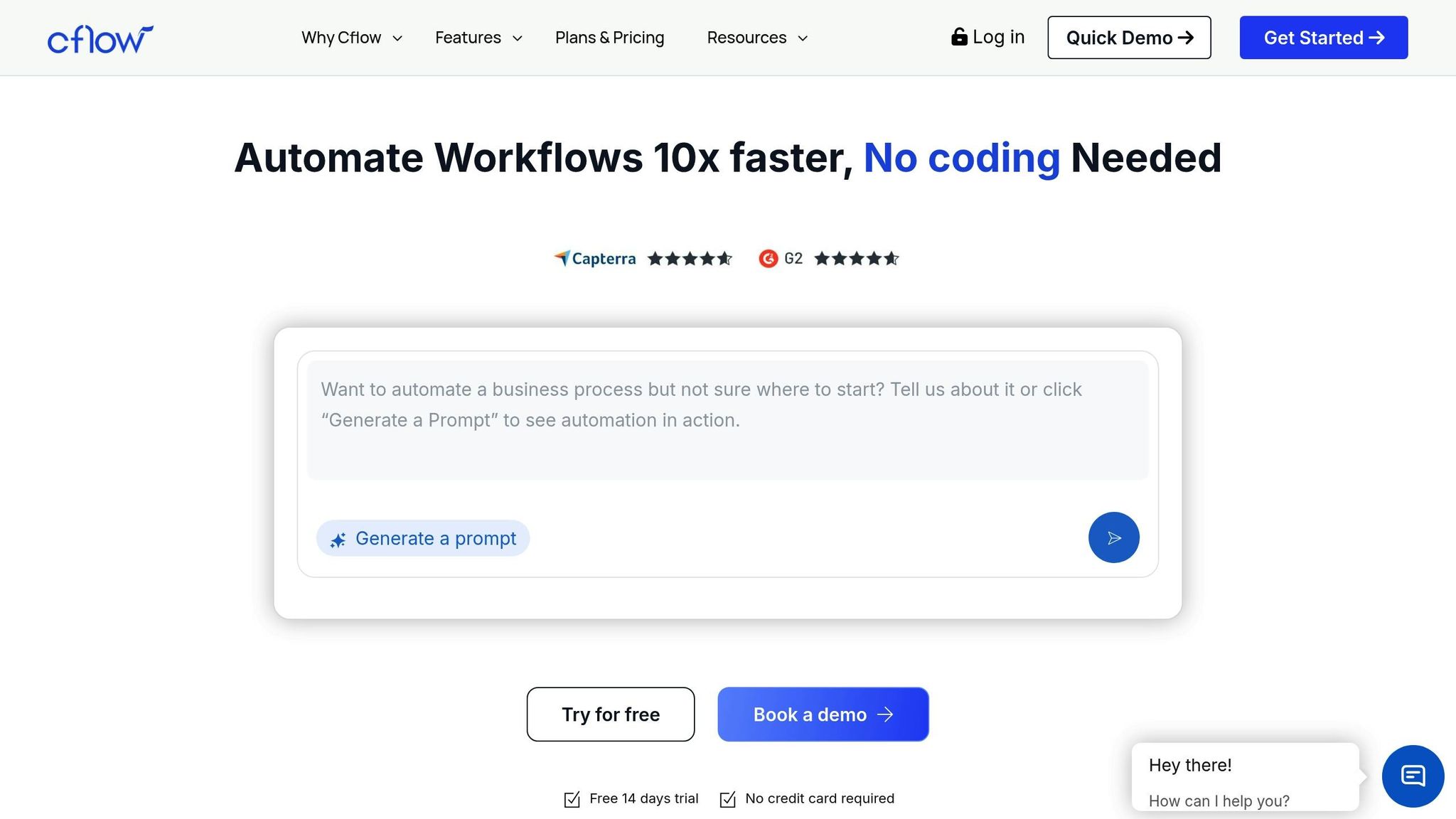
Cflow is a user-friendly, no-code platform designed for SMBs to streamline workflow automation, document management, and approval processes.
Starting Price
Cflow pricing begins at $7 per user/month when billed annually. If you opt for monthly billing, the cost increases. This pricing positions Cflow as one of the more budget-friendly options in the workflow automation market.
Free Plan/Trial Availability
Cflow provides a 14-day free trial with access to all features. This trial period allows users to set up workflows and thoroughly evaluate whether the platform aligns with their business requirements.
AI Features
Cflow incorporates practical AI tools such as automated document routing, approval logic, and basic predictive analytics. These features help optimize everyday tasks like invoice approvals, leave requests, and expense management, making routine operations smoother.
Integration Ecosystem
Cflow integrates with over 100 business applications, including popular tools like Slack, Google Workspace, and Zapier. While its integration network may not be as extensive as some competitors, it prioritizes seamless connections with widely used business tools, ensuring smooth data flow.
Scalability
Cflow is built to scale, accommodating businesses from startups to organizations with 500+ users. It has already powered 20,000+ workflows globally, helping companies reduce process cycle times by 60% and cut costs by 40%.
With a 4.5 out of 5 rating on G2 from over 120 verified users, Cflow is frequently praised for its ease of use, responsive customer support, and flexibility. However, some users have noted that its AI capabilities aren't as advanced as those offered by more feature-rich platforms.
Take your workflow automation even further with God of Prompt's extensive library of resources.
sbb-itb-58f115e
7. Make
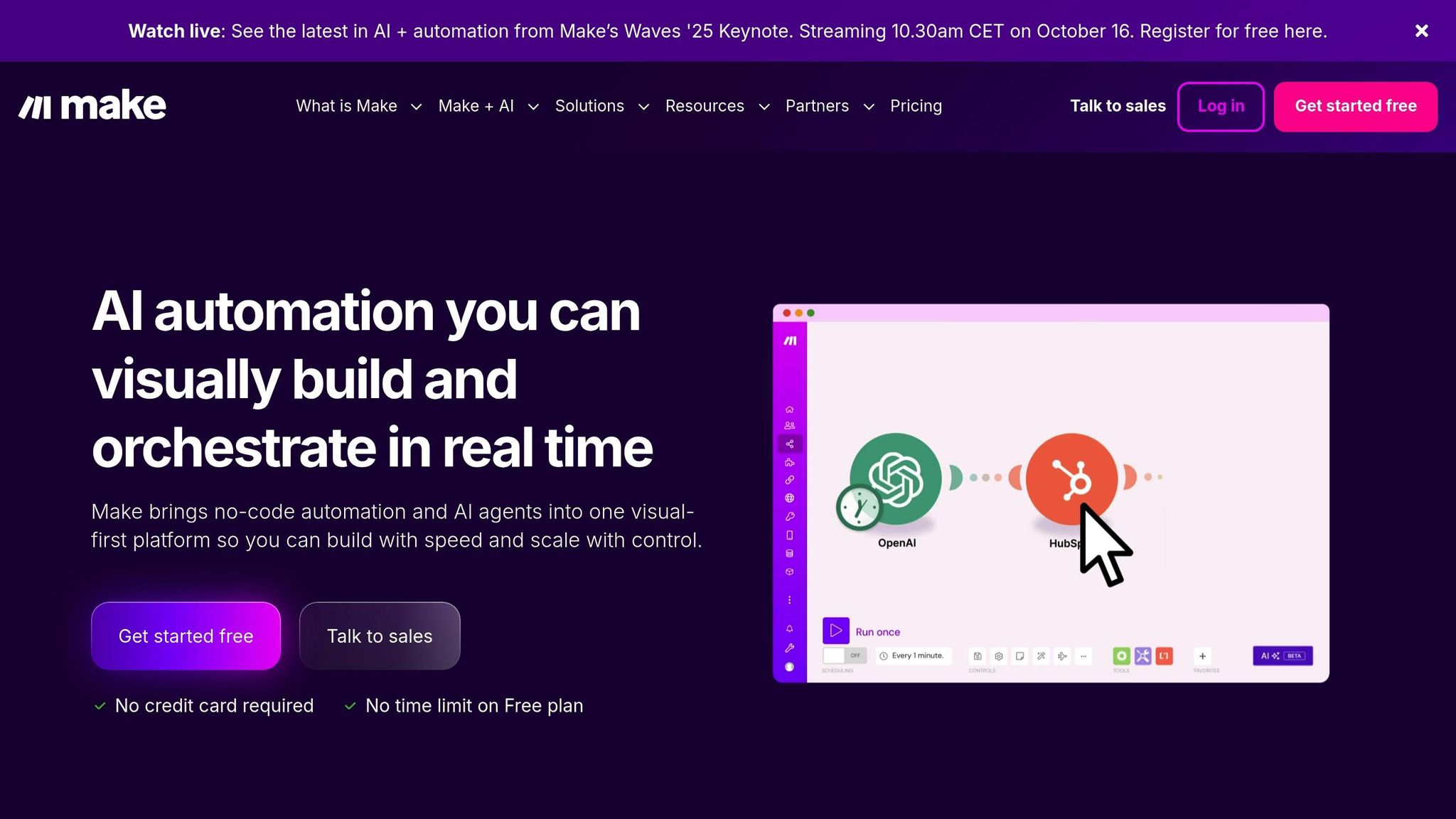
Make provides a user-friendly drag-and-drop interface tailored for small businesses, making it easy to automate multi-step processes - no coding required. It simplifies complex workflows, offering a practical solution for businesses looking to streamline operations.
Starting Price
Make's pricing starts at $9 per month when billed annually. This affordable entry-level plan includes access to the platform's visual workflow builder and essential tools for creating advanced, customizable automations.
Free Plan/Trial Availability
For those wanting to explore its capabilities, Make offers a free plan that allows up to 1,000 operations per month. While this is a great way to test the waters, the free tier comes with restrictions on operations, support, and features compared to the paid options.
AI Features
Though its core focus is visual automation, Make supports AI integrations through its extensive app ecosystem. This feature allows users to connect various AI services, enabling intelligent workflows that are accessible even to those without technical expertise.
Integration Ecosystem
Make integrates with over 2,000 apps and services, including widely used tools like Slack, Google Workspace, Shopify, and Salesforce. This vast ecosystem ensures small businesses can connect their essential tools effortlessly.
Scalability
As your business grows, Make's tiered plans adapt to your needs by offering more operations, additional users, and advanced features tailored to larger-scale workflows.
User Ratings
Make is highly rated by users for its intuitive visual workflow builder, flexibility, and affordability. Many appreciate how it enables the creation of sophisticated automations without requiring custom development.
For even more optimization ideas, check out God of Prompt's extensive prompt library to enhance your Make automations.
8. Zapier
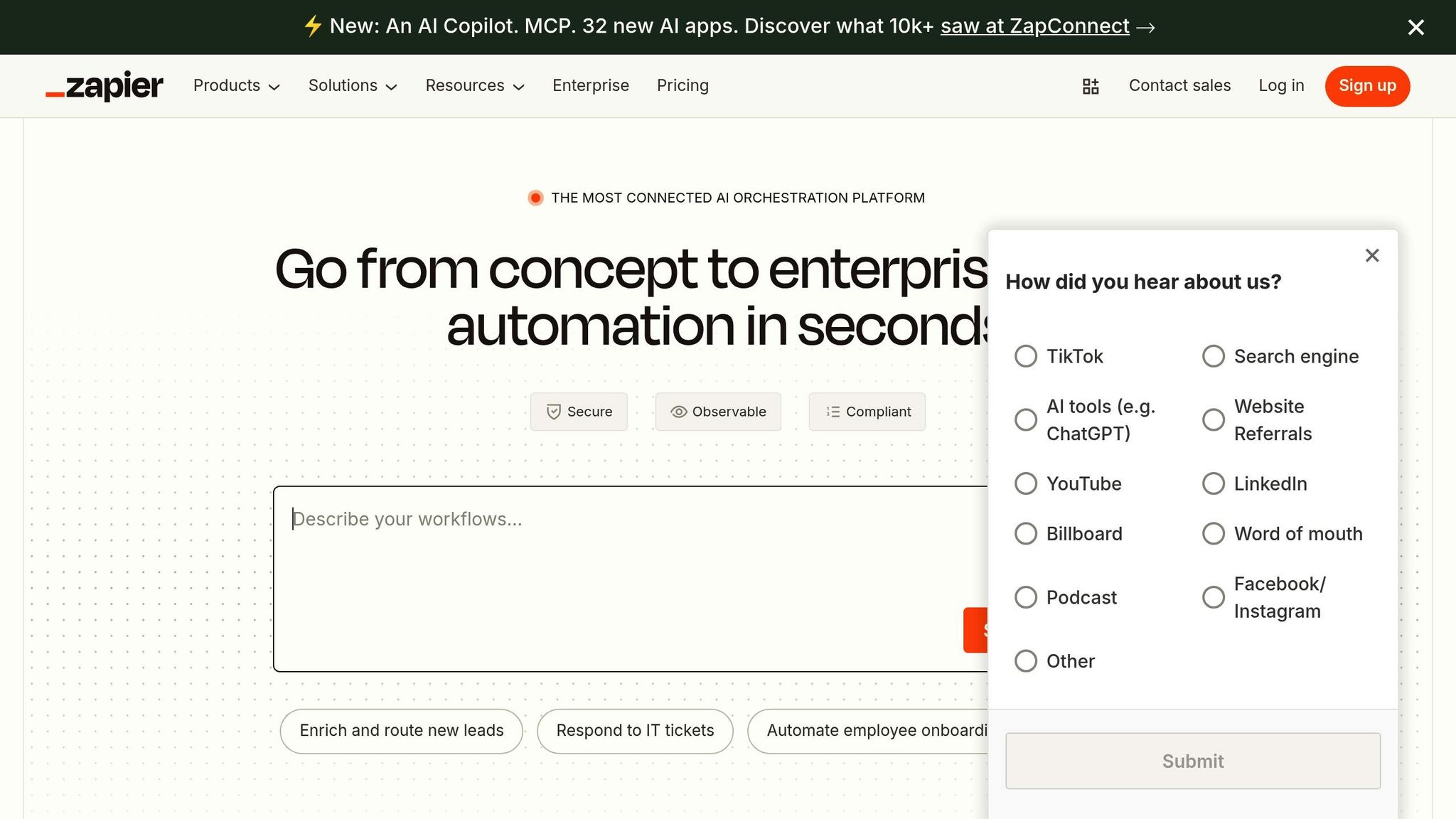
Zapier is a go-to tool for workflow automation, especially for small businesses that need to connect their favorite apps without diving into complex coding. Its straightforward interface and extensive library of integrations make it a favorite for automating tasks like lead management and customer support.
Starting Price
Zapier's paid plans kick off at $19.99 per month (billed annually) for the Starter plan. This package includes up to 20 Zaps and 1,000 tasks per month.
Free Plan/Trial Availability
Zapier provides a free plan that allows users to create up to 5 single-step Zaps, automating a maximum of 100 tasks per month. While this is a great way to explore basic features, the free tier doesn’t include multi-step workflows, premium app integrations, or advanced support options.
AI Features
Zapier uses AI to simplify automation. It can generate Zaps automatically from natural language prompts, format data intelligently, and integrate with large language models to assist with content creation and smart workflow routing.
Integration Ecosystem
Zapier supports a massive ecosystem of over 6,000 apps and services. This includes popular tools like Gmail, Slack, Salesforce, Shopify, and QuickBooks, giving small businesses the ability to connect the software they depend on every day.
Scalability and Ratings
Zapier is designed to grow with your business. Its tiered pricing structure adapts to increasing demands, with higher-tier plans such as Professional ($49/month), Team ($299/month), and Company ($399/month). These plans offer expanded task limits, multi-step workflows, conditional logic, and priority customer support.
As businesses scale and their automation needs become more complex, Zapier ensures they stay efficient by providing access to advanced features and premium integrations. The platform is highly rated, maintaining an average score of 4.7 out of 5 stars on G2, based on feedback from over 2,000 users.
For those looking to take their automations to the next level, tools like God of Prompt's AI prompt collections can help refine workflows with AI-driven content creation and smarter data handling.
9. Microsoft Power Automate
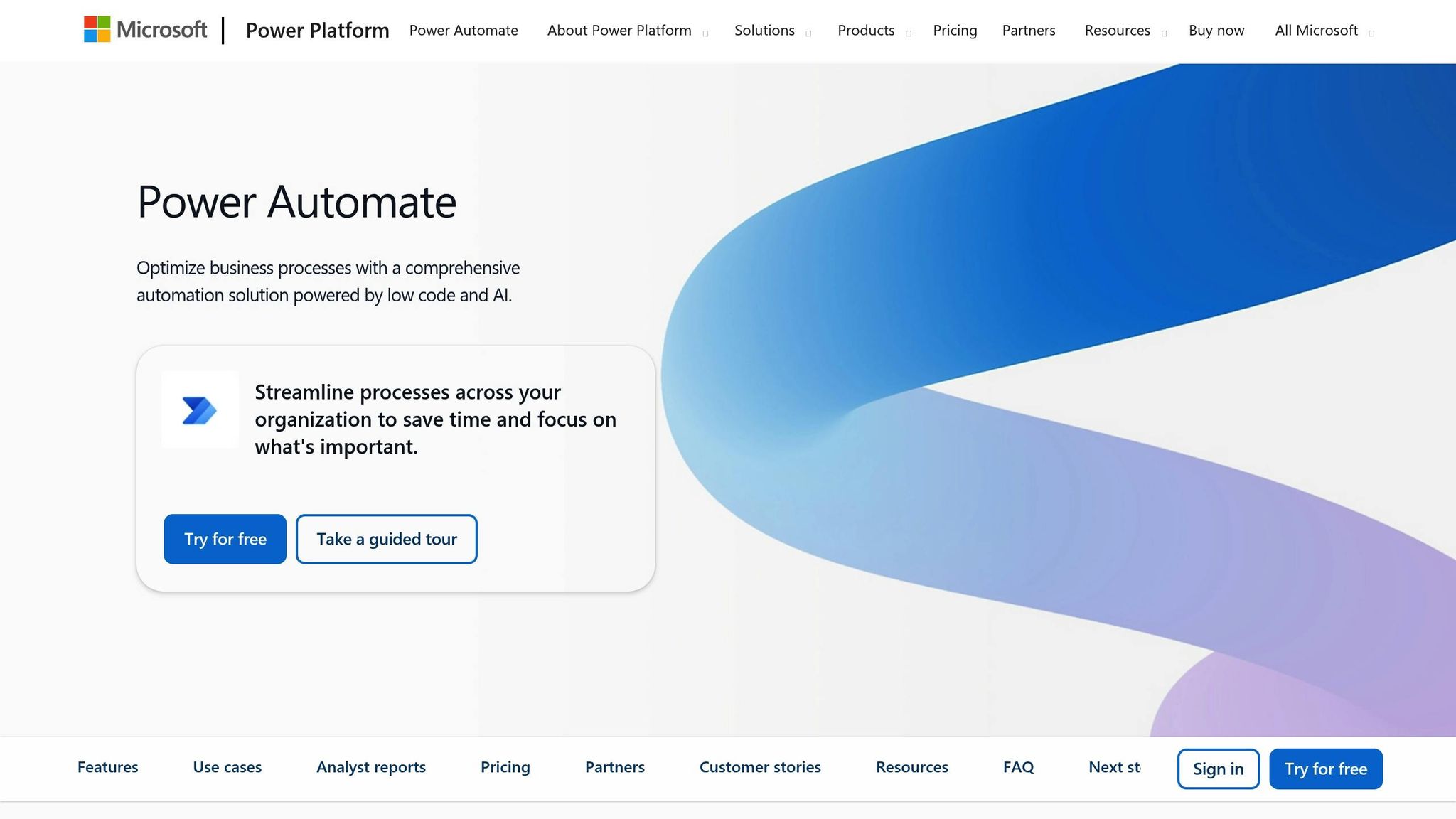
Microsoft Power Automate stands out as a robust workflow automation platform, especially for businesses already using Microsoft products. Its tight integration with the Microsoft ecosystem and advanced AI tools make it a strong option for small businesses aiming to streamline operations and scale their automation efforts.
Starting Price
The platform offers a "Per User" plan starting at $15 per user per month, allowing individuals to create unlimited workflows. For teams needing shared access, the "Per Flow" plan is available at $100 per flow per month, enabling multiple users to collaborate on the same automated processes.
Free Plan/Trial Availability
Although Power Automate doesn’t have a permanent free plan, it provides a 30-day free trial that unlocks premium features like AI Builder and advanced connectors. Additionally, Microsoft 365 subscribers can access limited Power Automate features for free, though premium connectors and advanced tools are restricted.
AI Features
One of Power Automate’s standout features is the AI Builder, which allows users to incorporate prebuilt or custom AI models for tasks like document processing, form recognition, and sentiment analysis - all without coding. The AI Builder operates on a credit-based system, with higher-tier plans including some credits. Additional credits can be purchased for $500 per unit per month (equal to 1 million service credits).
For example, a small marketing agency used Power Automate to streamline lead collection from web forms, automatically update their CRM, and send personalized email responses. This reduced their administrative workload by 30% and improved response times for clients.
Integration Ecosystem
Power Automate connects with over 500 business applications, including Salesforce, Google Workspace, Slack, and Dropbox. Its deep integration with Microsoft tools like Office 365, SharePoint, Teams, and Dynamics 365 ensures smooth single sign-on and unified data management, making it especially appealing to businesses already invested in Microsoft’s ecosystem.
Scalability and Market Impact
Currently used by more than 350,000 organizations worldwide - including 97% of Fortune 500 companies - Power Automate helps businesses achieve an average 27% reduction in manual processing time. Some case studies even report productivity gains of up to 40%. The platform is highly rated, with scores of 4.4/5 on G2 and 4.5/5 on Capterra.
With its strong AI capabilities and extensive integrations, Power Automate continues to be a key player in the automation space. Stay tuned for more tools and strategies in the following sections.
10. Pipedream
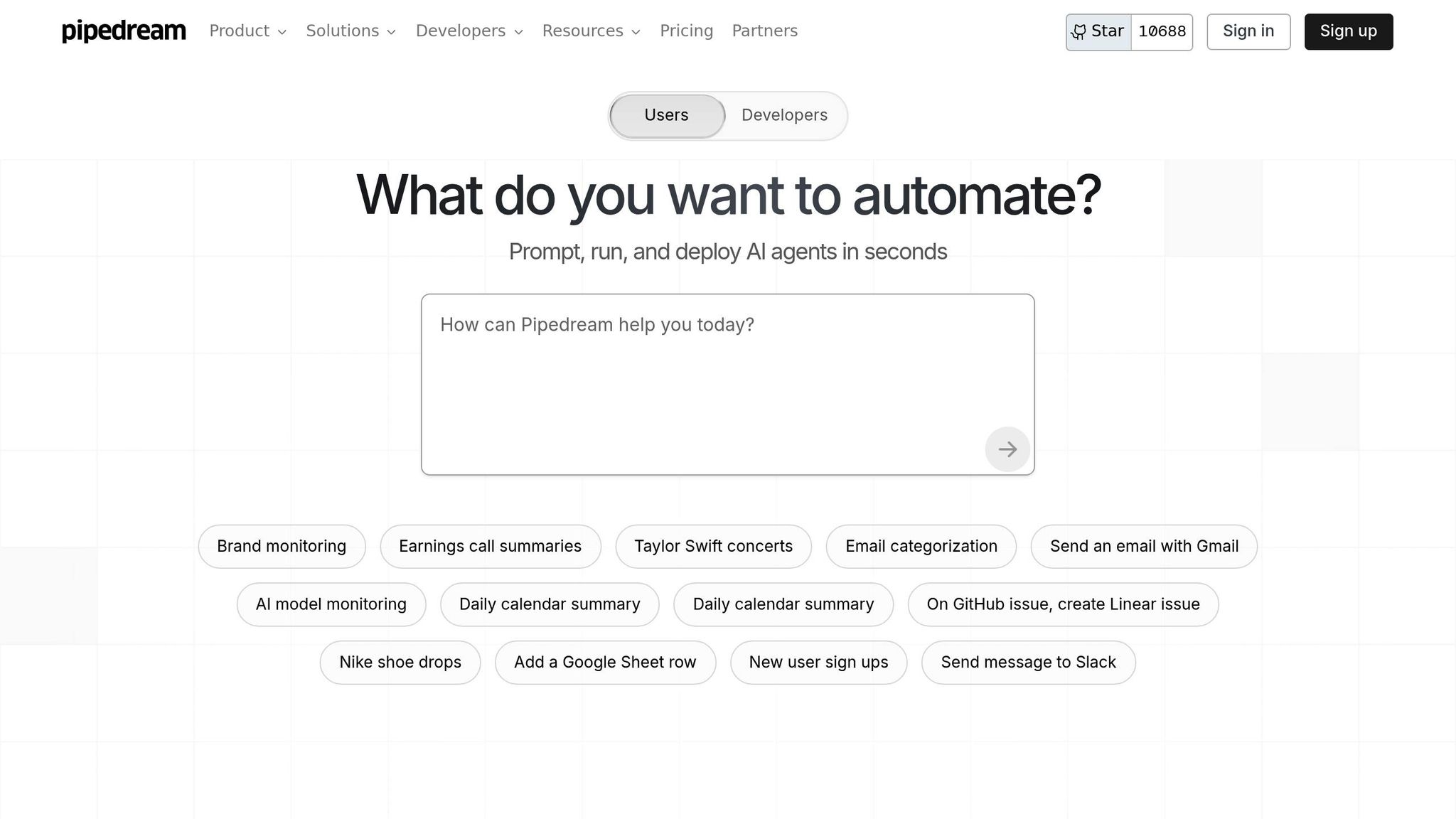
Pipedream blends the ease of no-code tools with the power of custom coding (Node.js, Python, Go, or Bash) directly within workflows. This cloud-based platform is particularly well-suited for technical teams and startups that need flexible and tailored automation solutions. By combining code and no-code, Pipedream stands out as a versatile choice in automation tools.
Starting Price
Pipedream’s pricing is based on a credit system instead of the typical task limits. The Basic plan costs $45/month, offering 2,000 credits, 10 active workflows, and 20 million AI tokens. For more advanced needs, the Advanced plan is priced at $74/month, providing 2,000 credits, unlimited workflows, and 50 million AI tokens. Enterprise-level teams can opt for the Connect plan at $150/month, which includes 10,000 credits and access to Pipedream Connect in production environments.
Free Plan/Trial Availability
Pipedream offers a permanent free plan, which includes 100 credits per month, up to 3 active workflows, and 2 million AI tokens. While this is a great starting point, the limited credits and workflows may not be sufficient for high-volume or complex automation needs.
AI Features
Pipedream integrates AI-powered automation directly into workflows using AI tokens. This enables tasks like email parsing, customer support automation, and lead qualification to be handled with minimal custom coding. For instance, a marketing agency could use Pipedream to enrich leads with AI-driven data extraction, analyze customer sentiment, and automatically move qualified prospects into their sales pipeline.
Integration Ecosystem
The platform supports a wide range of integrations, offering hundreds of pre-built connectors for popular SaaS tools, databases, and APIs. Whether you’re connecting Slack, Google Sheets, Salesforce, or creating custom integrations via HTTP requests, Pipedream provides the flexibility to meet diverse business needs.
Scalability
As your automation requirements grow, Pipedream offers higher-tier plans to accommodate increased credits, workflows, and AI tokens. Businesses can also explore custom Business or Enterprise plans, which include volume discounts and dedicated support. This scalability ensures that Pipedream can grow alongside your company, making it a reliable choice for expanding operations.
Pipedream has earned high marks from users, with a 4.6 out of 5 rating on G2 and a perfect 5 out of 5 on Capterra.
Advantages and Disadvantages
After a detailed look at pricing and features, here’s a breakdown of the main advantages and disadvantages of each tool, helping you make a decision based on your business needs, technical expertise, and budget.
Open-source platforms like n8n stand out for their flexibility and cost control. With a 4.8 out of 5 rating on G2 from over 131 reviews, n8n allows for extensive customization and self-hosting. However, this freedom comes with a trade-off: you’ll need technical skills to set up, maintain, and troubleshoot the system. For small businesses without IT support, this can be a challenging hurdle.
User-friendly options such as Lindy and Bardeen.ai focus on simplicity. Lindy’s natural language automation, rated 4.9/5 on G2, makes it accessible for non-technical users. Similarly, Bardeen.ai excels at automating repetitive web tasks with its browser-based approach. But as your business grows and requires more advanced integrations or complex workflows, these platforms may fall short.
Collaborative tools like Relay emphasize human oversight in automation, making them ideal for workflows that need human judgment. With a 4.9 out of 5 G2 rating, Relay’s human-in-the-loop design fosters team collaboration. However, this added layer of oversight can slow down fully automated processes, which might not suit businesses aiming for complete efficiency.
Enterprise-focused solutions like Microsoft Power Automate shine with robust security features and seamless integration into Microsoft 365. These strengths make it a great choice for businesses already using Microsoft products. On the flip side, the advanced features often come with higher costs, which might be prohibitive for smaller businesses.
Developer-friendly platforms such as Pipedream offer a mix of no-code simplicity and coding flexibility. With a 4.6 out of 5 G2 rating and a generous free tier, Pipedream appeals to technical teams. Yet, to fully utilize its dual capabilities, you’ll likely need specialized staff who can navigate both its visual interface and coding options.
Here’s a quick summary of the key pros and cons across platforms:
| Platform | Advantages | Disadvantages | Best For |
|---|---|---|---|
| n8n | Self-hosted, customizable, cost-efficient scaling | Requires technical expertise, complex setup | Tech-savvy teams seeking control |
| Lindy | Easy natural language setup, broad integrations | Limited support for complex workflows, newer platform | Non-technical users, basic automation |
| Gumloop | Visual builder, AI assistant, affordable pricing | Smaller integration ecosystem, fewer enterprise tools | Solo entrepreneurs, small teams |
| Bardeen.ai | Browser automation, intuitive interface | Limited to web tasks, fewer enterprise integrations | Marketing teams, web-focused workflows |
| Relay | Focus on human oversight, team collaboration | Slower full automation, rising seat-based costs | Teams needing approval workflows |
| Cflow | No-code simplicity, affordable pricing | Basic AI features, limited advanced automation | Small businesses, simple processes |
| Make | Visual workflow design, supports complex logic | Steeper learning curve, potential high costs | Non-coders needing sophisticated setups |
| Zapier | Extensive integration library, proven reliability | High costs at scale, limited customization | High-volume automation, established users |
| Microsoft Power Automate | Strong security, Microsoft integration, robust features | Complex interface, expensive advanced tools | Microsoft 365 users, enterprise needs |
| Pipedream | Coding flexibility, developer-friendly | Requires technical skills, complex credit-based pricing | Technical teams, custom automation |
Pricing structures play a big role in choosing the right platform. Task-based pricing offers predictability but can become expensive at scale. Credit-based systems require careful monitoring to prevent unexpected costs, while seat-based pricing grows as your team expands.
When evaluating costs, don’t forget to consider implementation, training, and maintenance. A higher-priced tool that your team can adopt quickly might ultimately save more money than a cheaper option that demands heavy customization and ongoing support.
Security and compliance needs should also factor into your decision. Self-hosted solutions like n8n give you full control over security updates and compliance measures, which is ideal for businesses with strict data regulations. On the other hand, cloud-based platforms handle these responsibilities for you but may not align with specific industry standards or data residency requirements.
For small businesses looking to maximize automation, tools like God of Prompt can enhance workflows across areas like marketing, SEO, and productivity. These resources can complement your chosen platform, making automation even more effective.
Conclusion
After diving into the pricing and feature breakdowns above, it’s clear that the best AI workflow automation tool for your small business depends on finding the right balance between cost, features, and your team’s technical know-how.
For startups keeping a close eye on expenses, Gumloop offers an affordable option at $37 per month, with its visual builder and all-in-one subscription model. If your team is more tech-savvy, n8n provides extensive customization through its open-source foundation, starting at just $24 per month. Need a tool designed for collaboration and workflow approvals? Relay.app fits the bill at $27 per month with its human-in-the-loop design. Meanwhile, non-technical users will appreciate Lindy.ai for its natural language automation and over 4,000 integrations, priced at $49.99 per month. For developer-focused businesses, Pipedream stands out with its flexible, credit-based pricing at $45 monthly.
Pricing structures also play a big role. Whether it’s task-based, subscription, or credit-based pricing, aligning the model with your team’s workflow patterns can help you avoid unexpected costs as your business scales.
Security is another major consideration. Self-hosted platforms like n8n offer full control over data and compliance, which is a huge plus for businesses in regulated industries. On the other hand, cloud-based tools handle security updates for you, though they may not meet every specific industry requirement.
The timeline for implementation matters, too. Tools like God of Prompt can speed up your automation process by offering access to over 30,000 AI prompts and guides for platforms like ChatGPT, Claude, Midjourney, and Gemini AI. These resources can help streamline workflows across marketing, SEO, and productivity tasks.
Ultimately, the best tool for your business is one that fits your current needs while being able to grow alongside you. A solution that works well for a small team today might not be cost-effective as you expand. Whether you’re drawn to the cost control of n8n, the simplicity of Gumloop, or the collaborative features of Relay.app, the key is finding a platform your team can implement easily and scale sustainably.
FAQs
What should I consider when choosing an AI workflow automation tool for my small business in 2025?
Choosing the best AI workflow automation tool for your small business in 2025 starts with identifying your specific needs and budget. Focus on tools that cater to your industry and processes, ensuring they can tackle your unique challenges effectively.
While cost is important, don’t overlook the long-term benefits a tool can bring - like saving time, increasing productivity, or sparking creativity. Resources such as God of Prompt offer AI prompts, guides, and toolkits that work alongside these tools, simplifying tasks in areas like marketing, SEO, and automation to help your business run more efficiently.
What are the key differences between task-based, credit-based, and subscription pricing models for AI workflow automation tools?
Pricing structures for AI workflow automation tools are typically designed around how usage is billed. Here’s a breakdown of the common models:
- Task-based: You’re charged for each individual task or action the tool performs. This option works well for businesses with irregular or infrequent usage patterns.
- Credit-based: You buy credits in advance, and the tool deducts from your balance as you use it. This model offers flexibility and helps manage expenses in smaller, controlled increments.
- Subscription-based: You pay a set monthly or yearly fee, which usually provides either unlimited access or usage within specific tiers. This is ideal for businesses with steady, predictable needs.
Each pricing model has its own advantages, so it’s essential to pick one that matches your budget and the way your business operates.
How can I choose an AI workflow automation tool that will grow with my business?
When choosing an AI workflow automation tool, it's important to pick one that can grow alongside your business. Look for tools with flexible pricing options and features you can tailor to your needs. This way, you can start on a smaller scale and expand as your requirements increase.
You should also focus on tools that easily integrate with other platforms and offer API connectivity. This ensures the system can adapt as your operations become more intricate. Lastly, make sure the tool is regularly updated or has a clear development roadmap. This shows it's built to evolve with advancements and support your long-term growth.






















